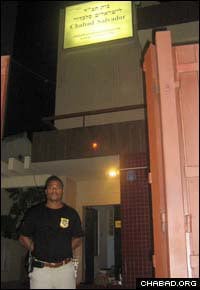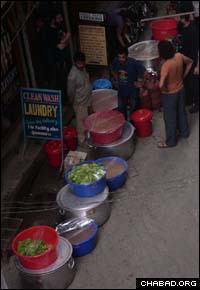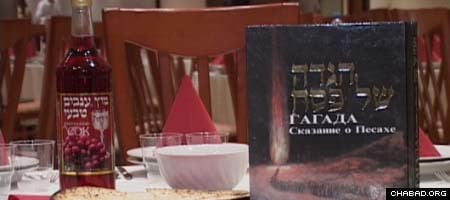Thousands of Chabad-Lubavitch centers across the globe will host communal Passover Seders this Saturday night and Sunday night for anyone who wants to come. All told, hundreds of thousands of people from all walks of Jewish life are expected at the feasts, which commemorate the Jewish people’s Exodus from Egypt 3,321 years ago. A handful of Chabad Houses reported on the special preparations involved this year due to the fact that Shabbat immediately precedes Passover.
Larnaca, Cyprus: Mapping the Cypriot Island With Seders
Surrounded by the hustle and bustle of people carrying boxes and answering phones, Rabbi Arie Zeev Raskin, co-director of the Cyprus Jewish Community Center describes the enormous logistical task of organizing five community Passover celebrations for the tourist destination popular with Israelis.
Besides the communal Seders at the center in Larnaca, feasts are planned in Ayin Napa, where the Chabad House has a permanent branch, Limassol and the capital city of Nicosia.
With a budget of more than $50,000, Raskin, with the assistance of Chabad-Lubavitch rabbinical students, is overseeing food preparation for some 800 people. Merkos L’Inyonei Chinuch, the education arm of Chabad-Lubavitch, provided a grant for the effort. Most of the provisions arrived from Italy and Israel, but the rabbi also arranged for a local boutique winery to produce the island’s first Kosher for Passover wine in hundreds of years.
“All of the food will be ready before Shabbat,” says Raskin, noting that preparing for the Seders on Shabbat itself is prohibited. “The community will gather on Shabbat afternoon and learn about Passover, and when Shabbat concludes, we will set up for the Seder.”
Salvador, Brazil: A Seder in Portuguese and Hebrew

Earlier this week, as workers at the center finished cleaning the kitchen and synagogue, chefs were busy preparing the mountains of food.
Rivky Bukiet says that early Shabbat morning, while it is still permitted to eat leavened products, the local community and visitors will eat challah and cookies in a side room that will be locked for the duration of Passover. They will then return to the main hall to enjoy a Shabbat meal that will be kosher for Passover (though no matzah will be served, per pre-holiday restriction). The first Seder will begin that night.
"We will be doing the Seder in two languages," says Bukiet, a fluent speaker of Portuguese. Her husband, a native Israeli, will lead the Seder in Hebrew. "The young community members love the dual programming with the Israelis," which features a lot of singing and dancing, says Bukiet. "They see that Judaism is not to be practiced sitting quietly in the corner quite. Rather, it is alive and vibrant."
Skokie, Ill.: Like in Ancient Jerusalem With the Sages
The tables will already be set up at the Chabad-Lubavitch center in Skokie, Ill., by the time Shabbat comes in. After the close of the holy day, as night ushers in the eight-day holiday of Passover, timers will turn on the food warmers. By the time the participants have explored the Haggadah and gotten to the section featuring the main meal, the food will be hot.
All in all, the preparations are not all that different from the thousands of other Chabad Houses worldwide, but Rabbi Yochanan Posner, director of adult education at the center, says that they’ll be offering Skokians a new twist this year.
“Many of those who first came to a Seder at Chabad House,” he explains proudly, “are now conducting their own Seder at home and inviting others in the community to come join them.”
However, since the latter group still wants the communal experience, the Skokie center will be hosting a Seder geared toward beginners the first night of Passover, and an advanced Seder, to delve deeper into the sub-texts of the Haggadah, the second night. Everyone, though, is welcome at both of them.
“Beginners enjoy the text of the Haggadah and its basic commentaries,” says Posner. “But once they are experts in the text and are conducting the Seder, they want to see how everything connects.”
The rabbi says that many guests will come to the second Seder “prepared with questions.”
He referenced the Seder mentioned in the Haggadah, which was attended by several sages and lasted all night.
Says Posner of his community members: “They want to be able to have a Seder like they had in Bnei Brak.”
Sofia, Bulgaria: Hitting the Road Before Shabbat

“In the other cities,” says Rabbi Yosef Salamon, co-director of the Rohr Chabad Jewish Community Center in Sofia, “we will be sending matzahs, wine, Haggadahs and other provisions to the local communities.”
Jewish leaders in those locations, who honed their Seder-conducting techniques under Salamon's tutelage, will lead their community’s ceremonies.
Salamon, who brought one ton of matzah to the country, delivered the special hand-baked unleavened bread to Jewish residents who did not have the necessary Seder ingredient. In Sofia, he says, the Chabad center’s newly completed and expanded kitchen will host a few hundred people for the Seder.
Kfar Chabad, Israel: Chernobyl Natives Joining Family Atmosphere
Natives of the area around Chernobyl, Ukraine, where the worst nuclear power plant disaster in history exposed hundreds of thousands of people to deadly and dangerous levels of radiation, will join Chabad-Lubavitch families for the Passover Seder. Close to 2,500 children who were brought to the central Israeli village of Kfar Chabad by Chabad’s Children of Chernobyl project will leave their dorms and head out to locations across the country to enjoy a home atmosphere for the holiday.
Many alumni of the program, some with their parents and siblings in tow, will also join the host families.
Medical staff will guide the hosting families in dealing with the children, many of whom have special health requirements due to their radiation exposure.
Hanoi, Vietnam: Italian-Style Gefilte Fish to Feature at Seder
With a blowtorch in his hand, Rabbi Menachem Hartman, co-director of Chabad-Lubavitch of Vietnam, koshered various utensils in preparation for Passover as he quickly contemplated whether or not his Ho Chi Minh Chabad House would fit all of the registered guests. Late in the night, he and his wife, fellow co-director Rachel Hartman, decided to split up the group into the Israeli backpackers and all other Jewish tourists, and have one group celebrate the Seder one block away at the Continental Hotel.
After Shabbat, rabbinical students from New York will cart food from the Chabad House to the hotel and lead the Seder there. The menu, prepared by a local Italian chef, will feature a special Bolognese gefilte fish.
Another Seder in the Vietnamese capital of Hanoi will be run by rabbinical students who koshered a local kitchen and spent the past week preparing the holiday foods with a local chef.
Baghdad, Iraq: Special Provisions Distributed Across the Country

Jewish soldiers at army bases across Iraq will use the supplies to host their own Seders this year.
“While we cannot bring these brave men and women to our Seder tables,” says Rabbi Aaron Lipskar, executive director of the Aleph Institute, “we have brought our Seder tables to them.”
Aleph also shipped packages to Jewish troops stationed in Korea, Japan, Afghanistan, Germany and other locations. The organization also sent Passover provisions to Jewish prisoners in the United States.
Passover, says Lipskar, “is our annual opportunity to rise above the mundane, and transcend both the physical and psychological pitfalls which can enslave any of us.”
To find a local Seder near you, click here.











Start a Discussion